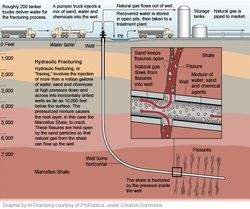By Evan Dawson, Managing Editor
 Last Thursday, a grassroots group went to Albany to ask state leaders to prevent hydrofracking from coming to New York state.
Last Thursday, a grassroots group went to Albany to ask state leaders to prevent hydrofracking from coming to New York state.
Many of the marchers were professionals in the Finger Lakes wine industry, which tends to view fracking as a serious threat. Winemakers and winery owners tell me there will be many more similar demonstrations, but they're not yet satisfied with the response from the wine industry.
Here are some big questions regarding fracking.
How severe could the environmental problems be?
There's no way to know, but the rhetoric can be strong.
Long-time New York Times wine writer Howard Goldberg wrote recently on Twitter, "Finger Lakes political and wine figures who favor fracking should have their heads examined. It would repeat BP in the Gulf."
A repeat of BP? Families in parts of Pennsylvania dealing with contaminated water would likely agree. Energy companies say that kind of rhetoric only polarizes the discussion. Several energy executives have told me that while no method is perfectly safe, perfection is an unfair standard that would shut down any kind of energy exploration in the world. The goal, they say, is to minimize mistakes while taking advantage of a vast natural resource under our feet.
Energy CEOs point out that there are often two miles of rock between the drill spot and the source of drinking water. However, well blowouts have occurred at all depths under the surface, and have been caused by an array of issues, including ruptured cement casing.
Are there other concerns?
In the Finger Lakes, yes. The bucolic image would certainly be impacted by hundreds of large trucks on the roads. Infrastructure would be affected. Many winery owners fear their ability to draw tourists to the peaceful, beautiful landscape of the region would be compromised.
Are there benefits?
Energy executives say there are two significant benefits. The first is the straightforward benefit of accessing vast amounts of domestic resources. They say this way would stem the reliance on foreign oil.
The second is the economic benefit to landowners on which fracking occurs. Some landowners have called the benefits a windfall; others have said it's not worth the environmental concerns.
What are the penalties for well blow-outs or contamination?
That's a hugely significant question that will need serious answers if fracking becomes common in New York state. One winery owner who did not wish to be identified told me, "I don't think we can stop fracking at this point, so if it's coming, we ought to be pushing for serious penalties when things go wrong. Make it so severe that these companies will bend over backward to get it right."
Over the coming months, when the state holds public comment forums, expect to hear plenty of questions about penalties.
What does Governor Cuomo think about fracking?
The New York Times recently reported that the Cuomo administration is set to allow fracking across the state, with the exception of the New York City and Syracuse watersheds. But the governor's office responds that he's still seeking input and evaluating the process.
Why would the New York City and Syracuse watersheds be excepted, but not the rest of the state?
Expect to hear this question asked often.
What's the timeline for a decision on fracking?
The DEC plans to hold public forums and allow for months of public comment. The cynic would say that this is a procedural necessity unlikely to alter the framework of the DEC's plans for fracking allowance. But again, the Cuomo administration has repeatedly said that public comment will be vital to the process.
